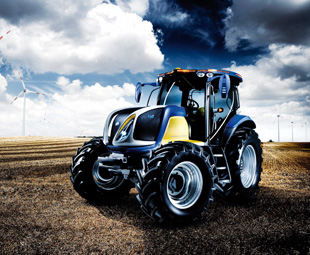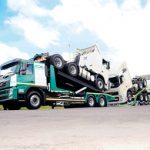Supporting energy-independent farming

New Holland’s energy-independent farm and hydrogen-powered tractor concepts offer farmers hope of an autonomous future. CLAIRE RENCKEN does some digging to find out more
New Holland’s energy-independent farm concept has far-reaching benefits for its customers, allowing them to create, store and use power in a convenient format. Central to the concept is the ability to produce electricity from natural, environmentally friendly sources and then reuse that electricity in a convenient and practical way. The impressive hydrogen-powered tractor, which won a gold medal at the SIMA Innovation Awards 2009, is just one part of a greater vision to free farmers from the increasing cost of fuel.
Fuel costs form a significant proportion of farmers’ operating costs. New Holland believes hydrogen technology will give farmers an independent supply of energy, which could be used in a wide variety of vehicles and applications, giving them greater control over the future of their business.
The traditional barriers to the use of hydrogen centre on its distribution and availability. The wide roaming capability of cars and trucks means that the use of hydrogen in commercial and personal vehicles has been limited, primarily by the lack of an extensive national distribution system, which would be very costly to implement.
The energy-independent farm concept envisages farmers producing their own compressed hydrogen from water and storing the hydrogen on the farm. Using a process called electrolysis – electricity produced by wind farms, solar panels or biomass and biogas processes, situated on the farm – would break water down into hydrogen and oxygen. While the hydrogen-powered tractor is the first practical step, it is the wider implications of the concept that could revolutionise the agricultural industry.
Pierre Lahutte, New Holland’s head of global product marketing, tractors and telehandlers, says: “Farmers are in a unique position to benefit from hydrogen technology. Unlike many people, they have the space to install alternative electricity generation systems, such as solar, wind, biomass or waste, and then store that power as hydrogen. Apart from the environmental benefits, such a system would allow customers to become energy independent and improve their financial stability.”
There are some unique advantages to using hydrogen. Many electrical production systems are currently in use by farms around the world, harnessing the power of the wind, sun and biomass. However, the electrical power that is not used at the time of production must be sold back to the national power system or lost. The energy-independent farm concept allows the power to be stored in the form of compressed hydrogen, which could then be used directly in farm machinery, or in generators, to provide electrical power and heat for buildings and numerous other applications.
Hydrogen-powered vehicles have been in development for many years and, in agriculture, offer benefits over battery-driven vehicles, which are efficient only in a stop-and-start cycle and take a long time to recharge.
Vehicles powered by hydrogen overcome these obstacles by using a hydrogen fuel tank to feed fuel cells in order to generate electricity within the vehicle; offering greater efficiency and improved flexibility. Fuel cells have a long working life and avoid the environmental issues associated with the disposal of batteries.
Energy-dense hydrogen can be stored conveniently, in a tank on the farm, as a compressed gas and the vehicle can be refuelled quickly. The relatively short operating distance, from a central working base, would give vehicles easy access to a central hydrogen tank installed at the farm, or satellite tanks, both fixed and mobile.
The hydrogen-powered tractor is a key element and practical demonstration of New Holland’s energy-independent farm concept. The experimental NH2 tractor, the first in the world to be powered by hydrogen, replaces the traditional combustion engine with hydrogen fuel cells to generate electricity.
Compressed hydrogen, drawn from a tank on the tractor, reacts in the fuel cell with oxygen, drawn from the air, to produce water and electrons. The electrons are harnessed in the form of an electric current, which drives electric motors to power the tractor’s drivetrain and auxiliary systems.
The NH2 tractor is a 79 kW (106 hp) working prototype able to perform all the tasks of a New Holland T6000 tractor, while operating virtually silently and emitting only heat, vapour and water.
Jaco du Preez, national sales manager for New Holland South Africa, says: “The first unit built was in South Africa for the Global Business Conference in December 2011 and then we displayed it at Nampo in May 2012. Since then a second (bigger) unit has been built.” The latter is currently in service on La Bellotta farm – the first energy independent farm – near Turin in Italy. The project has been partly funded by the Italian Ministry for Economic Development.
The fuel cell generates less heat than an internal combustion engine, offers a consistent output of power and does not produce polluting nitrogen oxides, soot particles or carbon dioxide. The clean operation of the tractor brings added health benefits when working in confined areas, such as animal sheds or greenhouses.
With the technology still being in the test phase, the tractor is not being marketed anywhere just yet. Du Preez adds: “Once testing is successful and there is an agreement between the cost of building and the price accepted by the market, these units will go into mass production. This will start in Europe and then slowly make its way to the rest of the world. Keep in mind that for us to market it in South Africa, we need to be able to sell ten or more, as we need to stock parts for them and it needs to be a viable proposition.”
It also needs to be affordable to our farmers, which will depend on the final production price, the price of hydrogen and the cost of setting up an energy-independent farming operation. But it does offer farmers a positive vision for the future, which would enable them to control their business costs while meeting the ever-growing demands to be more productive, more efficient and, at the same time, still protect the environment.
Published by
Focus on Transport
focusmagsa




